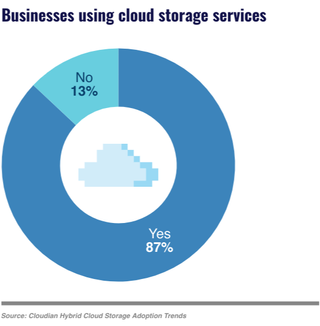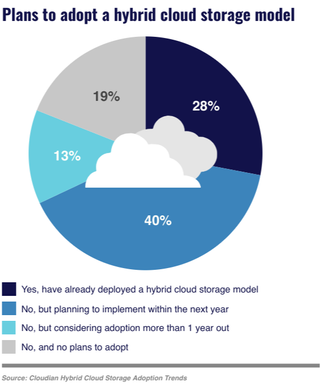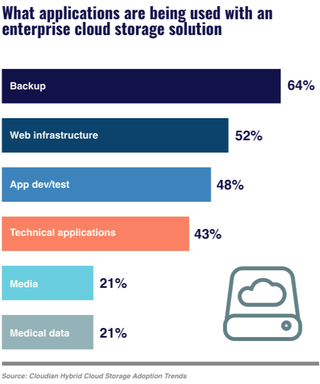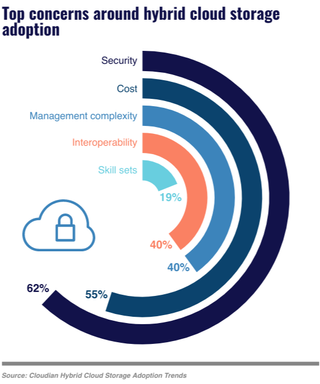The state of cloud storage in five charts
Cloud storage is used in at least one form by the vast majority of organisations, but where are these trends heading?

Storing data in the cloud is becoming more and more common as costs come down and the benefits to businesses take shape.
Cloud storage in at least one form is used by the vast majority of organisations, but how are attitudes changing and what challenges are still present for those looking to fully integrate it into their businesses?
Here, we give a run-down of the findings in five key charts, from a Cloudian survey of IT decision makers in the US and UK on hybrid cloud storage adoption trends, and in particular what concerns are front-of-mind with the technology.

Almost 9 in 10 businesses use some sort of cloud storage. At a first glance, this seems like an incredibly high number. But enterprise IT hasn't suddenly jumped into cloud storage. The chart below shows that people equate all kinds of common services with cloud storage, including file sync and share services such as Dropbox or OneDrive.
Less than one-third of respondents are using a cloud storage gateway, which combines a local appliance with cloud-based storage. Just 21% are using enterprise cloud storage, and even fewer are using a local application that leverages cloud storage.

Half of respondents are using file sync and share services, and 40% are using storage that exists in some kind of software-as-a-service (SaaS) application such as Salesforce or Office 365. This chart implies that organisations understand how to leverage cloud storage for specific applications such as file sharing and email, but they struggle when it comes to more general purpose cloud storage needs.

81% of respondents have either deployed some type of hybrid cloud storage solution or plan to at some point in the future. The fact that half of these are planning to within the next year shows that hybrid cloud storage is front-of-mind for many IT professionals.
Get the ITPro. daily newsletter
Receive our latest news, industry updates, featured resources and more. Sign up today to receive our FREE report on AI cyber crime & security - newly updated for 2024.

Data backup is the most popular use case for hybrid cloud storage solutions, with 64% of respondents planning or implementing deployments. Web infrastructure, application development and testing, and technical applications are also driving the adoption of hybrid cloud storage products and services.

With the constant stream of news around data loss and security breaches, it's not surprising that security is cited as a top concern when it comes to cloud storage. Cost is also a significant concern for over half of respondents, as IT budgets continue to be squeezed.
But a hybrid cloud solution is still seen as the most viable option for many businesses, despite security and cost concerns. This is mainly due to difficulties with data, with respondents citing on average that 47% of their data must stay local. Hybrid solutions enable companies to implement cloud-like scalability, but with local, on-premises object storage which meets regulatory compliance and internal data governance rules.
Picture: Shutterstock
Esther is a freelance media analyst, podcaster, and one-third of Media Voices. She has previously worked as a content marketing lead for Dennis Publishing and the Media Briefing. She writes frequently on topics such as subscriptions and tech developments for industry sites such as Digital Content Next and What’s New in Publishing. She is co-founder of the Publisher Podcast Awards and Publisher Podcast Summit; the first conference and awards dedicated to celebrating and elevating publisher podcasts.





